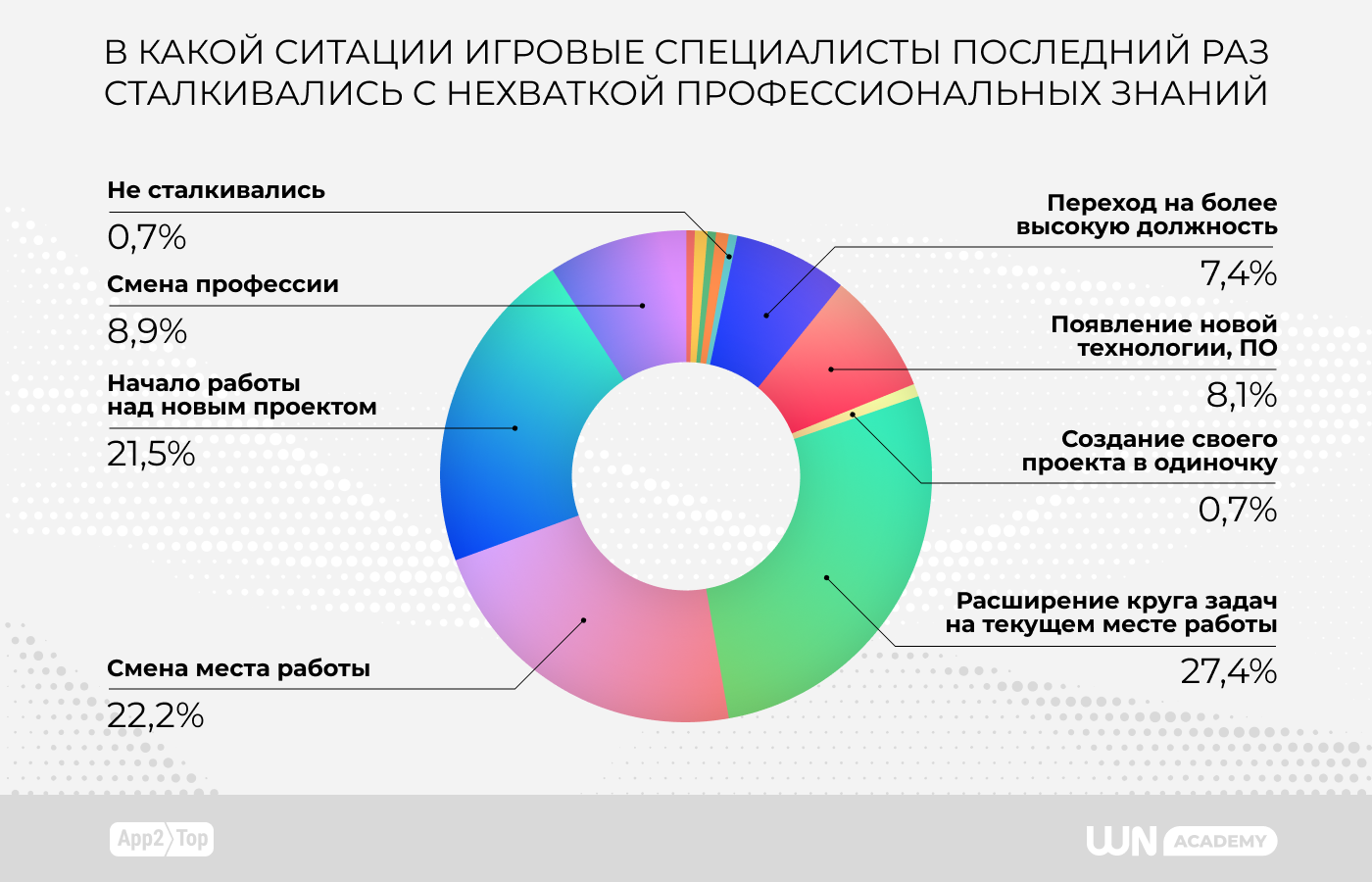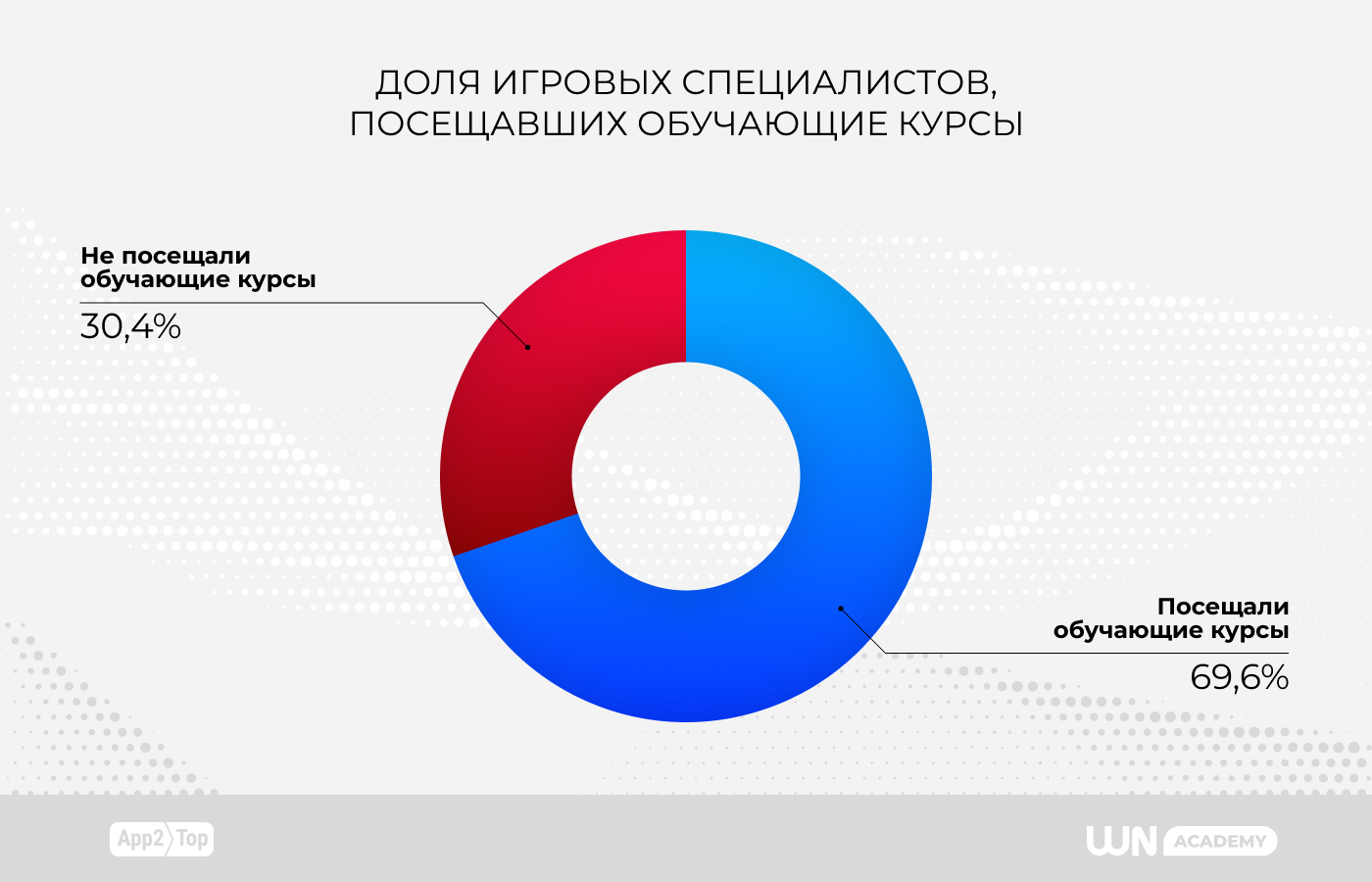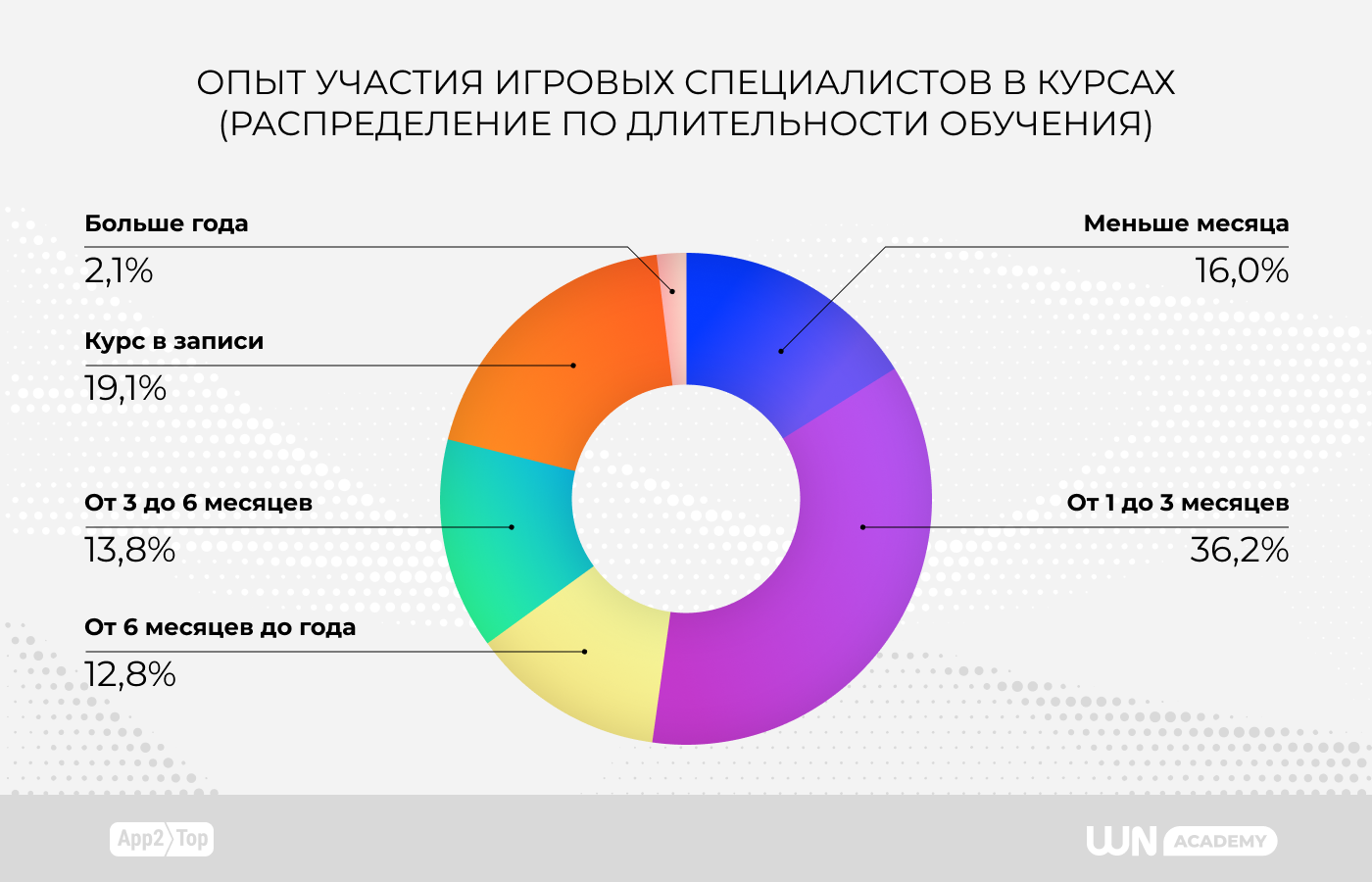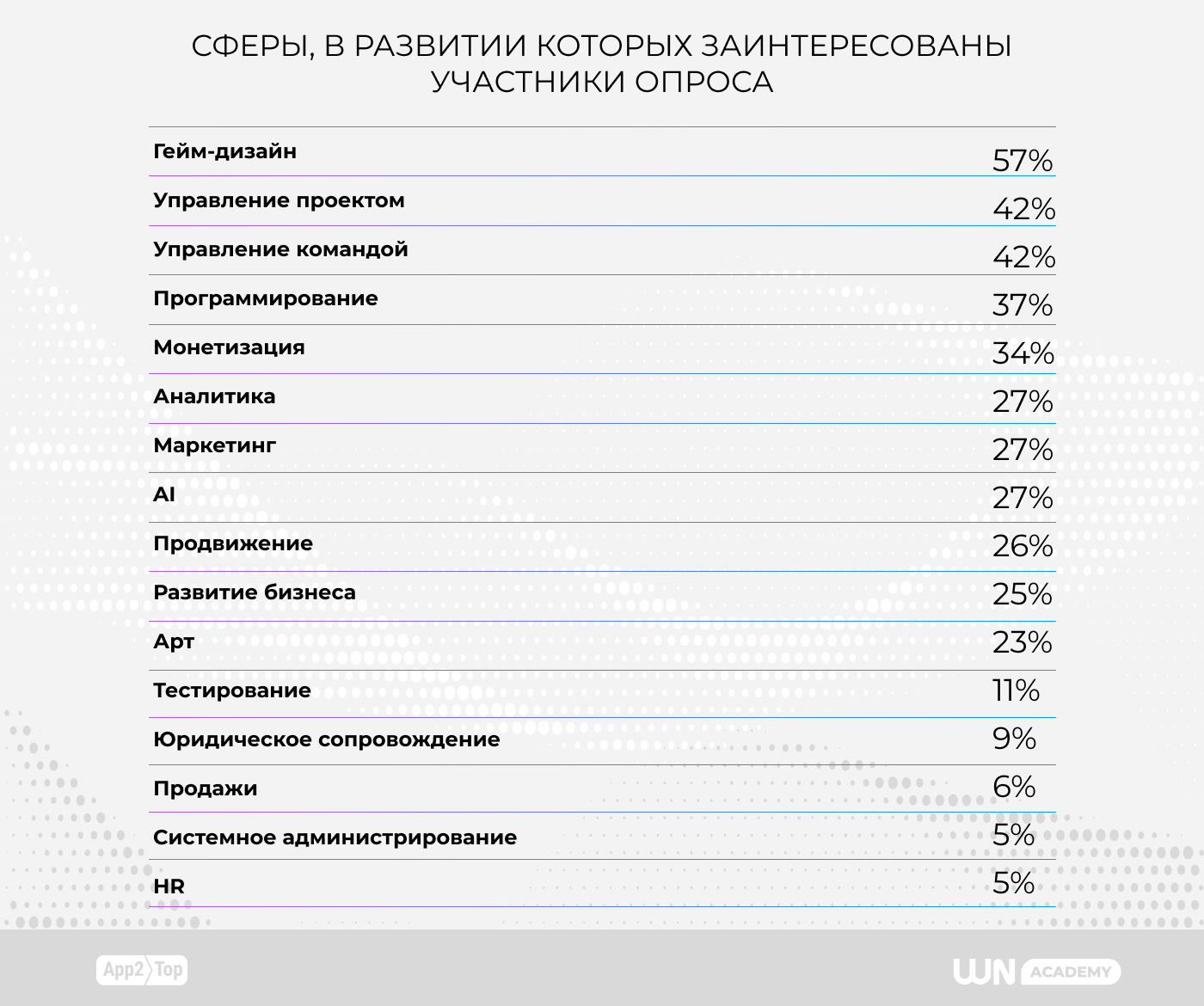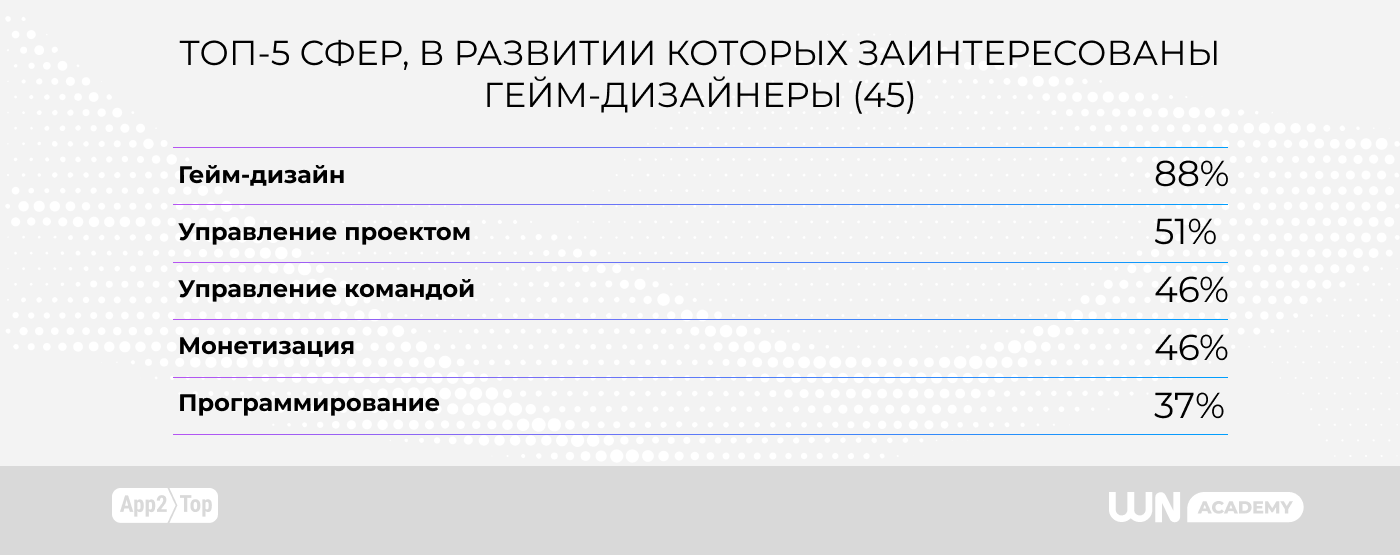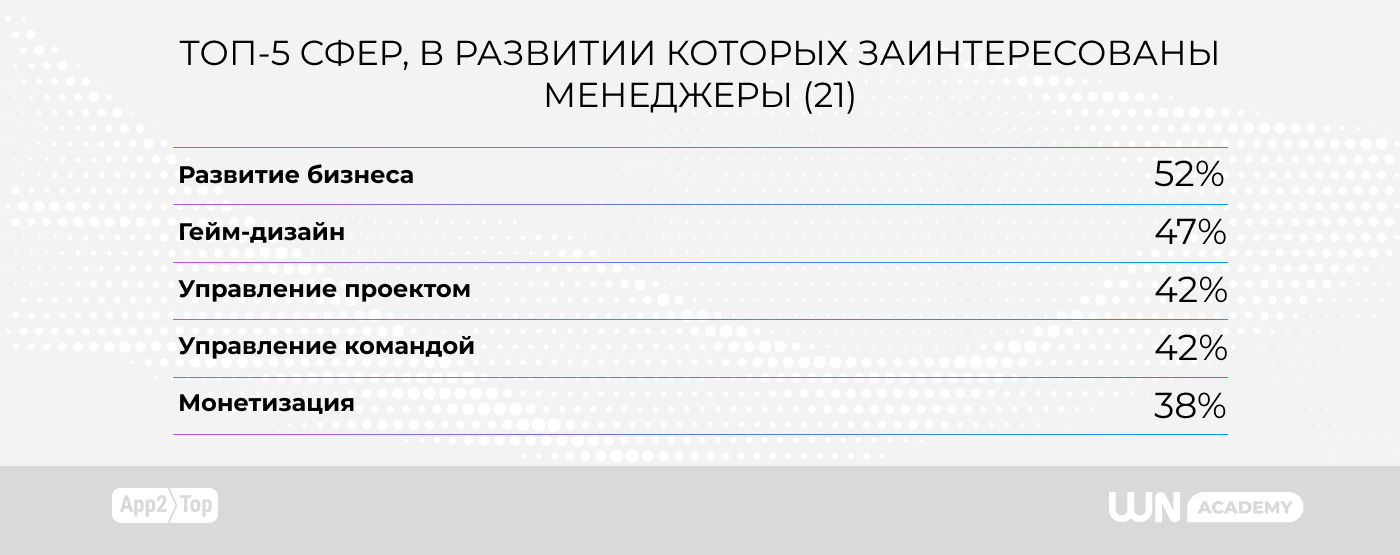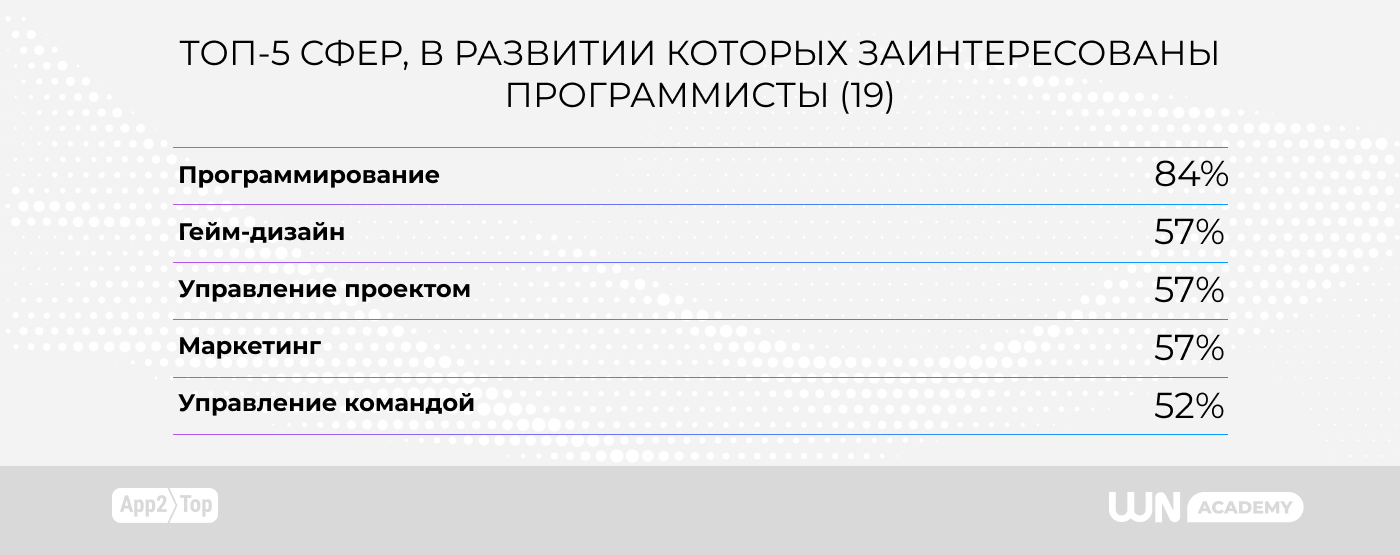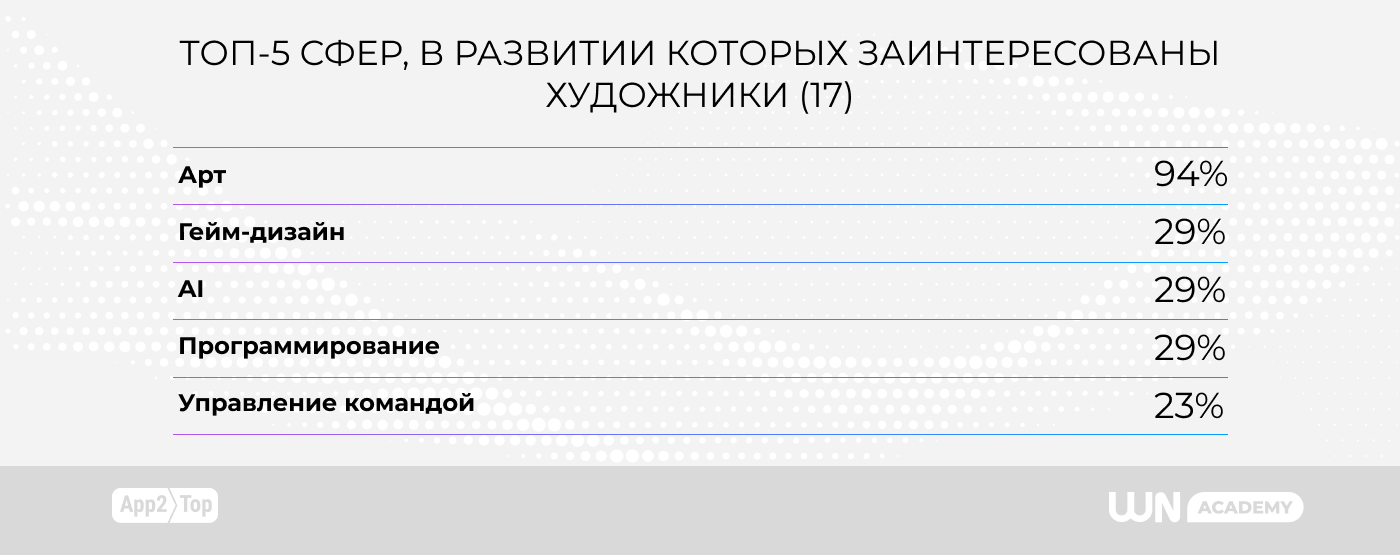App2Top, with the participation of the educational platform WN Academy, conducted a study dedicated to education in the game development industry. We share the results.
Respondent Profile
The majority of respondents are men (66%). The main age range of those surveyed is 25 to 34 years old (58%).
Most of the respondents work in game design (32%), management (16%), programming (14%), and art (12%).
The survey saw more active participation from Middle and Junior level specialists, accounting for 31% and 21% of completed questionnaires, respectively. Another 14% each were Senior and Lead specialists. Head and C-level specialists collectively accounted for just over 18%.
When They Encounter a Lack of Professional Knowledge
There are three most common scenarios where specialists lack knowledge:
- expanding the range of tasks (27%);
- changing jobs (22%);
- starting work on a new project (21%).
Only 7% of respondents noted that they last encountered a lack of professional knowledge when transitioning to a higher position.
How Do They Develop Their Professional Skills?
The most popular tools for self-improvement are job-related tasks and internet searches. In response to the question, "How do you develop your professional skills," 82% of respondents said, "I try to understand through current tasks at the workplace," and 80%, "I search for free information on the internet and figure it out myself."
Only 12% of respondents pursue higher education in the relevant field. Meanwhile, 36% regularly enroll in courses to improve their professional level. The least common practice is using mentors; only 4% of specialists resort to them.
Experience with Courses
Although only 36% of respondents regularly attend courses, the majority of surveyed game specialists have taken courses. Nearly 70% of respondents said they had attended training courses.
The type of courses attended varied by specialization.
For example, game designers usually attended courses on game design (71% of surveyed specialists in this field). Many game designers also improved their qualifications in management (44%).
Another example: half of the middle managers attended courses not only in their specialty but also in analytics.
The responses revealed a vast diversity of existing schools and courses attended by game specialists. In total, respondents mentioned 35 educational brands they had used. However, there are no clear dominators among them, and none of the schools garnered even 20% of mentions.
"This indicates that in the field of courses oriented directly at specialists already working in the game industry, there are no leading or particularly strong players where experienced personnel could go to enhance their qualifications," explains WN Academy manager Magdalena Stryevski.
Course Duration
Most game specialists took medium-length courses—one to three months (36%). Many also had experience with recorded courses (19%).
There is a direct correlation between the duration of the course and the amount paid for it. Short courses, less than a month long (likely a few introductory or promotional sessions), were often taken for free or a nominal fee by the respondents.
With longer programs, the situation is quite different. They are commercial in 85% of cases.
43.3% of the courses taken by respondents cost them $750 and above.
Course Reviews
The majority of respondents—50%—said the courses they took only partially met their expectations.
Those completely satisfied with their experience were not many, only 35%.
8% were completely dissatisfied with the courses.
The satisfaction level almost does not depend on the price. The aforementioned percentages slightly fluctuate in each payment segment, but overall, the situation is consistent: the majority is only partially satisfied, the second largest group is satisfied, and a minority is dissatisfied.
"The situation can hardly be called entirely healthy. Yes, on the one hand, we see that the number of specialists with utterly negative experiences is relatively small. But on the other hand, the fact that in half the cases students have numerous questions about the courses works against the educational sector. It may discourage them from working with other educational brands and continuing to engage with courses in general," warns Stryevski.
Company Support in Education
Only 48% of respondents working at companies noted that their studios cover the costs of professional training. Thus, the majority of game specialists have to pay for their professional development within educational programs out of their own pockets.
Meanwhile, 47% of those whose company provides such compensatory programs used them.
"Almost half of the specialists, whose company was willing to pay for their training, took advantage of this opportunity. This is an excellent indicator that shows the eagerness of game specialists to develop their professional skills. The problem is that not all industry workers have this opportunity. Not many companies finance their employees' professional development," concludes Stryevski.
Marina Lopatina, Business Development Director at the recruitment agency WN Talents, agrees:
"Our clients often lament that they have nowhere to find new Senior-level (and higher) specialists. This is a current issue for everyone. However, those companies that have a well-structured competence-building institution, including paying for external courses, suffer less from this. In extreme cases, they always have the option to take a Middle-level specialist and develop them."
Areas Game Specialists Want to Develop In
The most desirable area is game design, primarily due to the prevalence of game designers among the respondents.
For accuracy, in addition to the presented table above, we will separately list the primary demands relevant for:
- game designers;
- managers;
- programmers;
- artists.
Conclusions on the chapter:
- Specialists in the respective fields primarily prioritize their main directions;
- Regardless of direction, specialists are often very interested in expanding their knowledge of game design;
- In the top 5 most demanded areas across all mentioned directions is team management.
Attitude towards Knowledge
100% of respondents noted that they consider it important to develop professional knowledge.
However, a quarter of those surveyed stated that they have no demand for obtaining or developing professional knowledge in the gaming industry.
“It's normal when a small portion of specialists are satisfied with the current state of affairs and their own level of expertise. But in the IT industry, which undoubtedly includes game development, we rarely hear this. This is due to the fact that working on a product here implies the necessity of constantly mastering new tools, and also that we, as an agency, specialize in hiring experts for high positions. Such people continuously learn, they are aware of new technologies and trends, and they are successfully applying them in practice. Other types of people are not of interest to our employers,” explains Lopatina.
General Conclusions of the Study
The majority of industry participants strive to gain new knowledge within the industry. However, the predominant number of specialists limit themselves to individual work—seeking answers online in one form or another. Only about a third of respondents regularly engage in knowledge enhancement through live interaction (including courses).
But this does not mean that respondents have no experience. Most specialists have acquired knowledge in such a format in one way or another. However, of those who, for example, attended courses, half were only partially satisfied, and a tenth were disappointed. Perhaps this situation is one of the factors reducing the demand for specialized training.
Of special note is that when asked, "When was the last time you encountered a lack of professional knowledge," the answer "When moving to a higher position" was one of the least popular (this also applies to managers, for whom it was also among the least popular). Meanwhile, the answer "Expanding the range of tasks" was in the top 3 in popularity. This might indicate both the formalization of the institution of positions and that new positions are given when a specialist has already mastered the corresponding duties.
Data Collection Methodology
The survey was conducted in March-April 2024. Respondents answered the questions independently through a Google form. The link to the form was distributed via App2Top's tools (publications, banners, social media, mailings).
A total of 135 questionnaires were collected.

